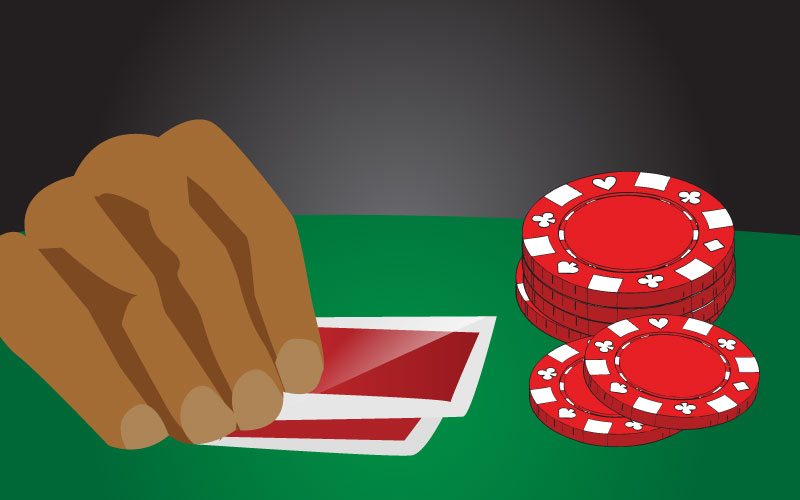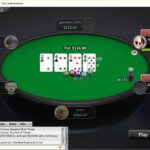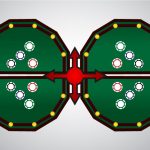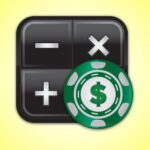Buy In
You should be looking for tells on your opponents even before they play a hand. Some people may call it prejudice or say it is unfair, but with the way poker is today you have to make these assumptions. After the poker boom, professional players had to learn to adjust to the swarm of new faces that they see every day. One big factor in this is how your opponents even buy their chips. There are two major differences in this area which can help you figure out how your opponent is going to play.
If they seem nervous, not sure how or who to ask to buy chips, are hiding their wallet, and quiet this probably means they will be conservative. This could be because they are new, feel overwhelmed, or are just tight by nature. I recall my first time in a casino, I folded about 40 hands in a row, and if you can pick up on this even before they sit down, you will have a major advantage. The other style you will generally see is someone coming in, waving their money in the air, smiling, talking with the dealer or the other players, and appearing very ready to play. This doesn’t necessarily mean they will be good, but it does mean they are in their comfort zone and tend to be more wild or aggressive. If you can pay attention to this, it can help you in early confrontations.
Pay Attention!
If there is one mistake that people make that may cost them more money than anything, it is not paying attention. Many times you will notice players only paying attention to their cards and nothing else. They arene’t observing their opponents. There could be a few different reasons for this, and there are even good players that have this weakness. But just giving your opponent a quick glance before you bet, or watching when the action is on him, can really help you in making a decision. On top of that, if you can remember these reads for the future, it can really help you in the long run. Remember, poker is a game where everyone gets two cards, not just you.
Hesitate
This is a technique that you can use to gather information you otherwise would not know about your opponent’s hand. If you time this move right, you can make your opponent hesitate. Just as he is about to bet, reach for your chips as if you are going to call instantly. Now depending on how the player reacts to this should affect your decision. If by doing this, your opponent looks back at his hand, hesitates, then bets forcefully it is almost always a bluff. Just by doing this one small move you can gain some very valuable information.
Patience
One thing you always need to pay attention to is a player’s patience. This is not just how patient they are with their cards, even though that is a large factor, but more so their body language. Many people have trouble hiding their body language. If you notice someone sitting back in their chair, looking relaxed, it is safe to assume they are very comfortable folding until they get a hand. If you notice your opponent then look at his hand, sit up straight, and look anxious and ready, this would be an indication that he’s found that hand he’s been folding for.
Pat or Not
Throughout what Caro teaches us, there is a set theme that he brings up quite often, “whenever an opponent goes out of their way to give you information about their hand before they have to, you can bet that information is false.” In draw poker, if someone has their hand raised as if they are going to stand pat instead of drawing cards, they almost always will be drawing. They are doing this to try and confuse you and planned on drawing cards all along.
Puzzling Look
Studious or puzzling looking players are usually not holding powerful hands. If you notice them studying the board, you, their hand, and are taking a while to make their decision, you should be able to bet into them. One sure spot of this is a player looking at their hand over and over or for a long period of time.
Also, if you ever notice someone exposing a card, they are going way out of their way to let you know something; what do you think that is? Generally, if they show you a dangerous card, you can read them as weak and if they show a weak card, you can read them as strong. Sometimes they may try to sell it as an accidental exposure, but most of the time it is deliberate and want you to do the opposite.
One other tell to look for is how a player checks to you. If they tap the table softly or gently, you can assume they are holding a weak or marginal hand. They don’t have any real conviction and are not threatening you. It can work the opposite, as can any tell, but without any prior information it usually means that they want you to check behind.
Sharing a Hand
If you ever notice someone sharing a hand with someone, perhaps at a home game, you can mark them as having a strong hand. Caro says it very well, “any unsophisticated player who bets, then shares his hand while awaiting a call, is unlikely to be bluffing.” This can be for a few reasons, but they probably would not be playing a weak hand while showing it for fear of embarrassment.
Tapping
You may notice people tapping their fingers a certain way after making a bet, and this can be great information for you. If a player makes a bet while tapping his fingers rhythmically, and keeps tapping them after making the bet, you can read this as a strong hand, as the player is comfortable and continues to tap in the same pattern. However, if you notice your opponent tapping their fingers perhaps in no particular pattern, and freeze when it looks like you are going to call, you can bet on his hand being weak.
Under the Table
Expanding on tapping their fingers, you can spot good tells under the table as well. If you notice someone shaking their leg while making a bet, you can learn a lot from this, but there are a couple of things to look out for. If you see their leg shaking even after they make the bet and you look like you are going to call, you can read them for a strong hand. However, if you see their leg stop moving after betting, this is almost always weak. They suddenly freeze and are nervous that you may call so they stop moving completely.
Submit your review | |









